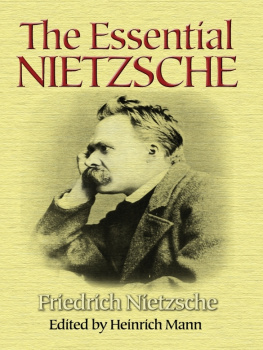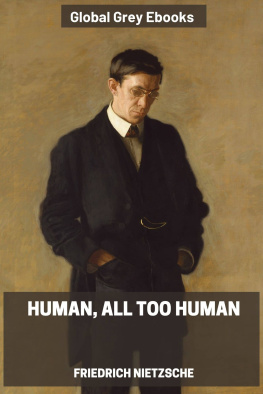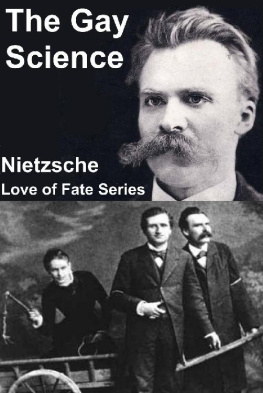Nietzsche Friedrich - Thoughts out of season
Here you can read online Nietzsche Friedrich - Thoughts out of season full text of the book (entire story) in english for free. Download pdf and epub, get meaning, cover and reviews about this ebook. genre: Science. Description of the work, (preface) as well as reviews are available. Best literature library LitArk.com created for fans of good reading and offers a wide selection of genres:
Romance novel
Science fiction
Adventure
Detective
Science
History
Home and family
Prose
Art
Politics
Computer
Non-fiction
Religion
Business
Children
Humor
Choose a favorite category and find really read worthwhile books. Enjoy immersion in the world of imagination, feel the emotions of the characters or learn something new for yourself, make an fascinating discovery.
- Book:Thoughts out of season
- Author:
- Genre:
- Rating:3 / 5
- Favourites:Add to favourites
- Your mark:
- 60
- 1
- 2
- 3
- 4
- 5
Thoughts out of season: summary, description and annotation
We offer to read an annotation, description, summary or preface (depends on what the author of the book "Thoughts out of season" wrote himself). If you haven't found the necessary information about the book — write in the comments, we will try to find it.
Thoughts out of season — read online for free the complete book (whole text) full work
Below is the text of the book, divided by pages. System saving the place of the last page read, allows you to conveniently read the book "Thoughts out of season" online for free, without having to search again every time where you left off. Put a bookmark, and you can go to the page where you finished reading at any time.
Font size:
Interval:
Bookmark:
The Project Gutenberg EBook of Thoughts out of Season (Part One)by Friedrich Nietzsche(#4 in our series by Friedrich Nietzsche)
Copyright laws are changing all over the world. Be sure to check thecopyright laws for your country before downloading or redistributingthis or any other Project Gutenberg eBook.
This header should be the first thing seen when viewing this ProjectGutenberg file. Please do not remove it. Do not change or edit theheader without written permission.
Please read the "legal small print," and other information about theeBook and Project Gutenberg at the bottom of this file. Included isimportant information about your specific rights and restrictions inhow the file may be used. You can also find out about how to make adonation to Project Gutenberg, and how to get involved.
**Welcome To The World of Free Plain Vanilla Electronic Texts**
**eBooks Readable By Both Humans and By Computers, Since 1971**
*****These eBooks Were Prepared By Thousands of Volunteers!*****
Title: Thoughts out of Season (Part One)
Author: Friedrich Nietzsche
Release Date: May, 2004 [EBook #5652][Yes, we are more than one year ahead of schedule][This file was first posted on August 4, 2002]
Edition: 10
Language: English
*** START OF THE PROJECT GUTENBERG EBOOK, THOUGHTS OUT OF SEASON (PART ONE) ***
This eBook was produced by Holden McGroin.
Thoughts Out Of Season - Part One by Friedrich Nietzsche
The First Complete and Authorised English Translation
Of the First Impression of
One Thousand Copies
this is
No. 1
ANTHONY M. LUDOVICI _________________________________________________________________
RICHARD WAGNER IN BAYREUTH
_________________________________________________________________
EDITORIAL NOTE.
_______
THE Editor begs to call attention to some of the difficulties he hadto encounter in preparing this edition of the complete works ofFriedrich Nietzsche. Not being English himself, he had to rely uponthe help of collaborators, who were somewhat slow in coming forward.They were also few in number; for, in addition to an exact knowledgeof the German language, there was also required sympathy and a certainenthusiasm for the startling ideas of the original, as well as aconsiderable feeling for poetry, and that highest form of it,religious poetry.
Such a combinationa biblical mind, yet one open to new thoughtswasnot easily found. And yet it was necessary to find translators withsuch a mind, and not be satisfied, as the French are and must be, witha free though elegant version of Nietzsche. What is impossible andunnecessary in Frencha faithful and powerful rendering of thepsalmistic grandeur of Nietzsche is possible and necessary inEnglish, which is a rougher tongue of the Teutonic stamp, andmoreover, like German, a tongue influenced and formed by an excellentversion of the Bible. The English would never be satisfied, asBible-ignorant France is, with a Nietzsche l'Eau de Colognetheywould require the natural, strong, real Teacher, and would prefer hisoutspoken words to the finely-chiselled sentences of the raconteur. Itmay indeed be safely predicted that once the English people haverecovered from the first shock of Nietzsche's thoughts, their biblicaltraining will enable them, more than any other nation, to appreciatethe deep piety underlying Nietzsche's Cause.
As this Cause is a somewhat holy one to the Editor himself, he isready to listen to any suggestions as to improvements of style orsense coming from qualified sources. The Editor, during a recent visitto Mrs. Foerster-Nietzsche at Weimar, acquired the rights oftranslation by pointing out to her that in this way her brother'sworks would not fall into the hands of an ordinary publisher and hisstaff of translators: he has not, therefore, entered into anyengagement with publishers, not even with the present one, which couldhinder his task, bind him down to any text found faulty, or make himconsent to omissions or the falsification or "sugaring" of theoriginal text to further the sale of the books. He is therefore in aposition to give every attention to a work which he considers as of noless importance for the country of his residence than for the countryof his birth, as well as for the rest of Europe.
It is the consciousness of the importance of this work which makes theEditor anxious to point out several difficulties to the youngerstudent of Nietzsche. The first is, of course, not to begin readingNietzsche at too early an age. While fully admitting that others maybe more gifted than himself, the Editor begs to state that he began tostudy Nietzsche at the age of twenty-six, and would not have been ableto endure the weight of such teaching before that time. Secondly, theEditor wishes to dissuade the student from beginning the study ofNietzsche by reading first of all his most complicated works. Nothaving been properly prepared for them, he will find the Zarathustraabstruse, the Ecce Homo conceited, and the Antichrist violent. Heshould rather begin with the little pamphlet on Education, theThoughts out of Season, Beyond Good and Evil, or the Genealogy ofMorals. Thirdly, the Editor wishes to remind students of Nietzsche'sown advice to them, namely: to read him slowly, to think over whatthey have read, and not to accept too readily a teaching which theyhave only half understood. By a too ready acceptance of Nietzsche ithas come to pass that his enemies are, as a rule, a far superior bodyof men to those who call themselves his eager and enthusiasticfollowers. Surely it is not every one who is chosen to combat areligion or a morality of two thousand years' standing, first withinand then without himself; and whoever feels inclined to do so ought atleast to allow his attention to be drawn to the magnitude of his task. _________________________________________________________________
DEAR ENGLISHMEN,In one of my former writings I have made the remarkthat the world would have seen neither the great Jewish prophets northe great German thinkers, if the people from among whom these eminentmen sprang had not been on the whole such a misguided, and, in theirmisguidedness, such a tough and stubborn race. The arrow that is tofly far must be discharged from a well distended bow: if, therefore,anything is necessary for greatness, it is a fierce and tenaciousopposition, an opposition either of open contempt, or of maliciousirony, or of sly silence, or of gross stupidity, an oppositionregardless of the wounds it inflicts and of the precious lives itsacrifices, an opposition that nobody would dare to attack who was notprepared, like the Spartan of old, to return either with his shield oron it.
An opposition so devoid of pity is not as a rule found amongst you,dear and fair-minded Englishmen, which may account for the fact thatyou have neither produced the greatest prophets nor the greatestthinkers in this world. You would never have crucified Christ, as didthe Jews, or driven Nietzsche into madness, as did the Germansyouwould have made Nietzsche, on account of his literary faculties,Minister of State in a Whig Ministry, you would have invited JesusChrist to your country houses, where he would have been worshipped byall the ladies on account of his long hair and interesting looks, andtolerated by all men as an amusing, if somewhat romantic, foreigner. Iknow that the current opinion is to the contrary, and that yourcountry is constantly accused, even by yourselves, of its insularity;but I, for my part, have found an almost feminine receptivity amongstyou in my endeavour to bring you into contact with some ideas of mynative countrya receptivity which, however, has also this in commonwith that of the female mind, that evidently nothing sticks deeply,but is quickly wiped out by what any other lecturer, or writer, orpolitician has to tell you. I was prepared for indifferenceI was notprepared for receptivity and that benign lady's smile, behind whichladies, like all people who are only clever, usually hide their inwardcontempt for the foolishness of mere men! I was prepared for abuse,and even a good fightI was not prepared for an extremelyfaint-hearted criticism; I did not expect that some of my opponentswould be so utterly inexperienced in that most necessary work ofliterary execution. No, no: give me the Germans or the Jews forexecutioners: they can do the hanging properly, while the Englishhangman is like the Russian, to whom, when the rope broke, thehalf-hanged revolutionary said: "What a country, where they cannothang a man properly!" What a country, where they do not hangphilosophers properlywhich would be the proper thing to do tothembut smile at them, drink tea with them, discuss with them, andask them to contribute to their newspapers!
Next pageFont size:
Interval:
Bookmark:
Similar books «Thoughts out of season»
Look at similar books to Thoughts out of season. We have selected literature similar in name and meaning in the hope of providing readers with more options to find new, interesting, not yet read works.
Discussion, reviews of the book Thoughts out of season and just readers' own opinions. Leave your comments, write what you think about the work, its meaning or the main characters. Specify what exactly you liked and what you didn't like, and why you think so.














